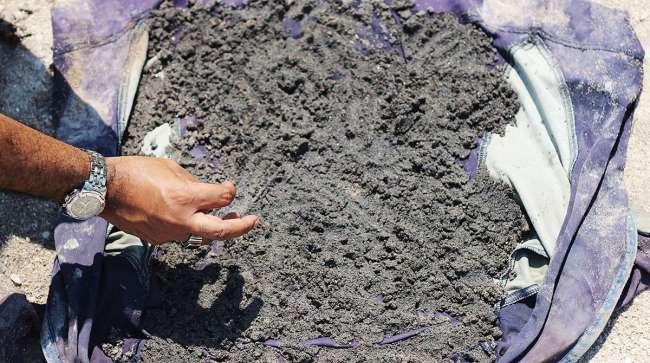Senior Reporter
Trucking-Related Companies Find It Difficult to Identify 'Conflict Minerals' in Supply Chains

[Stay on top of transportation news: Get TTNews in your inbox.]
It has been more than six years since America’s public companies began searching for African “conflict minerals” throughout their complex supply chains, with the goal of curbing funding for hostilities and human rights abuses in the Democratic Republic of Congo region.
Despite progress, it remains difficult for trucking-related companies and other firms to know for sure if some of their products are being made using tantalum, tin, tungsten or gold, or “3TG,” mined and refined in Congo and nine of its neighbor countries — and if so, to what extent.
Part of the challenge has been that some of the companies were unable to get responses from all of their hundreds of suppliers during their searches. Take trucking supplier Wabco Holdings Inc., for example, which said it received survey responses in 2019 from only 652 of its 1,584 suppliers.

Bolden
“Based upon information available to us at the present time and after completing our diligence, we are unable to determine the origin of the 3TG in certain of our products,” said the company’s Form SD report to the U.S. Securities and Exchange Commission filed just before the June 1 deadline. “Due to a number of unidentified smelters referred to by our suppliers as the potential source of some of the 3TG materials in our products, we are unable to determine whether our products contain conflict minerals that originate from the covered countries.”
It was in 2010 that Congress passed a law directing the SEC to require U.S. public companies to conduct annual searches for the conflict minerals in the Congo region. The four minerals or their derivatives have been determined by the U.S. secretary of state to be financing hostilities and unthinkable human rights abuses in the region.

How can trucking companies adjust to ensure that essential freight keeps moving while protecting their workers from coronavirus? Host Seth Clevenger speaks with Lilli Chiu of Hub International and Dave Cox of Polaris Transportation. Hear a snippet, above, and get the full program by going to RoadSigns.TTNews.com.
However, three years ago, an appeals court decision in a case challenging the requirement caused the SEC to retreat, saying it would not enforce the requirement.
The so-called Form SD report began as a regulatory requirement by the SEC in 2012, but has since morphed into an annual display of corporate social responsibility and transparency, according to Tanya Bolden, director of supply chain and corporate responsibility practices at the Automotive Industry Action Group, a leader early on in developing search practices for the automobile industry.
“I think there’s a level of transparency that companies can benefit from,” Bolden told Transport Topics. “I think it demonstrates to the supply chain that these are important issues and that there is an ethical and responsible expectation of performance of these companies within the supply chain.”
It also has put a corporate process in place that will have future uses, she said.
Other trucking-related companies noted challenges in their 2019 conflict mineral searches:
- Cummins Inc: “Most of the responses the company received indicated that the 3TG in the suppliers’ components and materials either were not sourced from smelters located in a covered country, were not necessary to the functionality of the components and materials or the source country was undeterminable.” The company performed what it called “a reasonable country of origin inquiry,” in which it surveyed 1,033 direct suppliers.
- Navistar International: “We reviewed the responses from our suppliers and our analysis indicates that many contained inconsistencies or incomplete data,” Navistar reported. “Furthermore, although most suppliers provided responses that listed the known smelter/refiners in their supply chain, they did not specify which smelter/refiners were associated with products shipped to Navistar.” The truck maker’s conclusion came after a survey of 1,037 direct suppliers in its truck segment.
- Eaton Corp.: “Eaton solicited approximately 1,100 suppliers to gather detailed information regarding the existence of the minerals in products sold to us, as well as the origin and chain of custody of the minerals,” the company reported. “Based on the information provided by Eaton’s suppliers and our own due diligence efforts through Dec. 31, 2019, we do not have sufficient information to conclusively determine the countries of origin or chain of custody of minerals in our products.”
- Paccar Inc.: “Based on the information provided by our suppliers, we believe the smelters and refiners listed in this conflict minerals report may have been used to process/produce 3TG minerals contained in Paccar products,” the company reported. “The total number of smelters and refiners listed has increased 9% over the prior year, with all categories of conflict minerals reflecting an increase from the prior year.”
- Meritor Inc.: “Based upon the results of our due diligence, we are unable to rule out the presence of 3TG in certain of our products or to determine the origin of all 3TG which may be contained in our products,” the company’s report said. “Accordingly, we cannot exclude the possibility that some of our products may contain 3TG which may have originated in one or more of the covered countries.”
Want more news? Listen to today's daily briefing:
Subscribe: Apple Podcasts | Spotify | Amazon Alexa | Google Assistant | More

